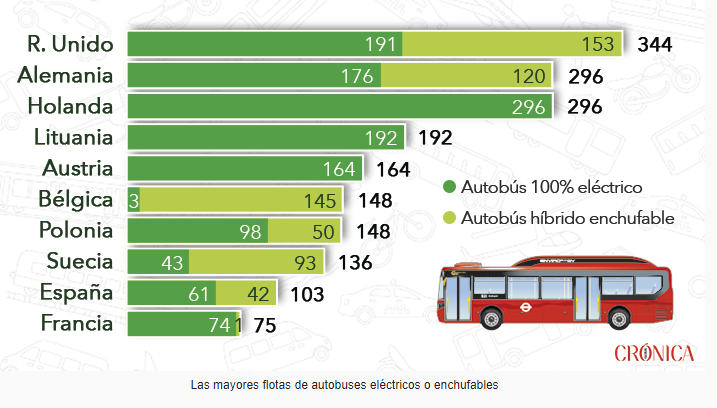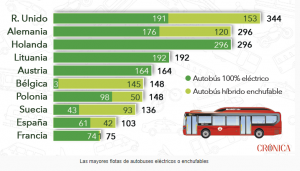
School transport and the environment
Daily trips of school routes represent a significant percentage of bus trips in the cities of the world, especially in the United States, where this service is very frequent. Therefore, various manufacturers are betting on the creation of new fully electric vehicles to reduce the environmental impact of those trips.
In May 2018, the Canadian manufacturer The Lion Electric Co. announced together with the road management, cleaning and transportation company First Priority GreenFleet (FPGF) the largest deployment of fully electric school buses in the history of North America by a single manufacturer of equipment (OEM). The two companies have partnered to launch approximately 40 fully electric school buses in the state of California in more than 15 school districts during the past 12 months, reaching a total of more than 150 buses in two years. The highest concentration of fully electric school buses is currently in the state of California, where subsidies and financing options are more favourable.
In addition to the Canadian manufacturer, there are other North American manufacturers that are investing in the development of fully electric school buses. Blue Bird is an American manufacturer that, through grants from the Department of Energy, has developed two fully electric models (one bus and one microbus) to provide services to school routes.
Compared to the US, in Spain, electric buses have not yet penetrated the school transport network, but we are taking our steps in urban transport, for example.
The bus sector is a key agent in the development of efficient and sustainable mobility. Its environmental impact is less than that of other modes of transport. In Spain, transportation is responsible for 28.7% of the total CO2 emissions expelled into the atmosphere, the car being the main responsible for it. The bus is the mode that generates less greenhouse gases and it is 3.7 times less polluting than the plane, 5.5 times less than the car and 13% less than the train.
Although within the branch of school transport, Spain is not very advanced, in general electric bus transportation in Spain is not at all badly located:

In this line, each electric bus replaces 178 barrels of diesel and reduces carbon dioxide emissions by 13.7 tons per year. Thus, for every 1,000 such buses on the road, 500 barrels of fuel will be buried per day.
Globally, according to a report of Bloomberg New Energy Finance (BNEF), the total number of e-buses in service will increase more than threefold until 2025, from 386,000 units to 1.2 million vehicles, almost half the number (47%) of the urban bus fleet, according to this study.
China, a country that suffers a lot from pollution, leads this race, adding 7,600 zero-emission vehicles to its fleet every month.
On the other hand, Austria, Germany, Lithuania, the Netherlands and Great Britain have together added some 1,250 plug-in or electric hybrid buses. In Spain we count with 103 vehicles. In the case of London, its mayor, Sadiq Khan, has launched the largest fleet in Europe: 51 vehicles built by BYD – which has already delivered more than 10,000 buses in the world – and Alexander Dennis Limited.
From Chapín we are concerned about the environment and we have very much in mind the respect and preservation of nature, which leads us to the application of environmental policies and other actions such as:
-
- Adaptation to the Environmental Management and Surveillance Plan based on the ISO 14001: 2004 standard, certified by AENOR.
- Fleet management and control system: through the ON LINE tracking of the fleet we can optimize the routes.
- Environmental management and training plan.
- Euro V and VI low consumption engines.
- Less polluting engines: most of our vehicles are Euro V and VI, complying with the strictest European regulations.
- Authorized waste manager: as required by ISO 14001: 2004, Grupo Chapín Autocares, has an authorized provider for waste collection and management.
- Use of biodegradable detergents.
- Driver training in efficient driving and environmental management.
